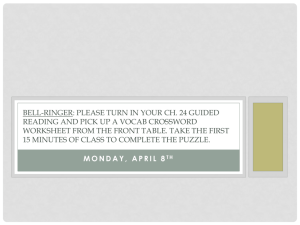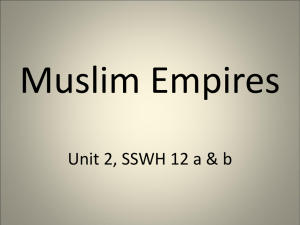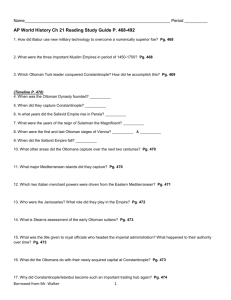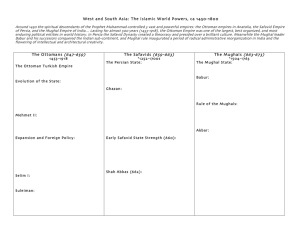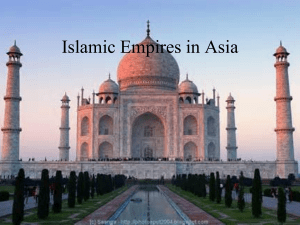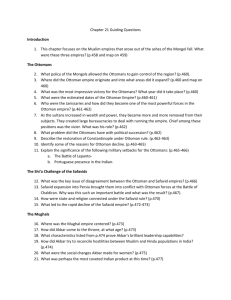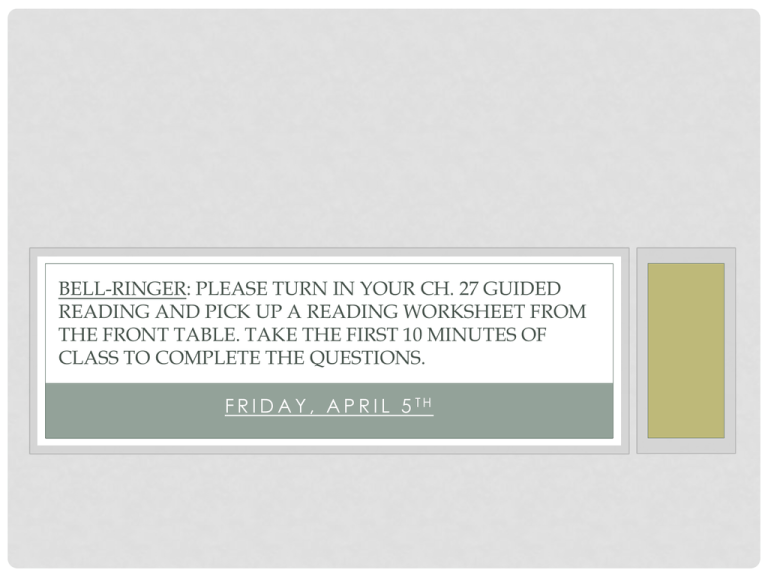
BELL-RINGER: PLEASE TURN IN YOUR CH. 27 GUIDED
READING AND PICK UP A READING WORKSHEET FROM
THE FRONT TABLE. TAKE THE FIRST 10 MINUTES OF
CLASS TO COMPLETE THE QUESTIONS.
F R I D A Y , A P R I L 5 TH
DAILY AGENDA:
•
•
•
•
•
Bell-Ringer: Reference/Research Review
Word of the Day devoid
Activator: Religious Conflict in the Balkans
Lecture: The Gunpowder Empires
Review Quiz
Homework: Read Chapter 24 and complete Guided
Reading worksheet.
DEVOID – lacking, bereft, vacant;
completely lacking in substance or
quality.
What is the worst movie you have ever seen?
Why did you select this movie? You probably
chose the movie because it was DEVOID of
humor, plot, and decent acting. Here is a list
of movies that were panned (to criticize
severely) by critics for being DEVOID of all
redeeming value: Battlefield Earth, Gigli,
Godzilla, From Justin to Kelly, Glitter, Speed
Racer, Did You Hear About the Morgans?,
and Shark Night 3D.
DEVOID – lacking, bereft, vacant; completely
lacking in substance or quality.
Which of the following do you think is the Odd
Word Out? Why ?
Bereft
Barren
Bare
Brimming
Devoid
“Odd Word Out“
Friday, April 5th, Block 2
DEVOID – lacking, bereft, vacant; completely
lacking in substance or quality.
Which of the following do you think is the Odd
Word Out? Why ?
Bereft
Barren
Bare
Brimming – antonym of DEVOID
Devoid – beginning in “d”
“Odd Word Out“
Friday, April 5th, Block 2
Working with a shoulder partner, complete the question packet on the
Balkan Crisis.
THE ISLAMIC GUNPOWDER
EMPIRES
KEY CONCEPTS AND COMPARISON
DID THE DEVSHIRME SYSTEM WORK?
• Positives: Provided
highly trained soldiers
who had no problem
killing Turks and
Muslims.
• Negatives: Grew too
powerful; favoritism
created problems
with the cavalry
which led to
rebellions and
agricultural decline.
OTTOMAN ORIGINALS:
• Askeri vs. Raya Military Class (Askeri) was
free from taxes/dependent on Sultan; Raya =
“flock of sheep” (everyone else)
• Land-grant system Turkish cavalrymen
given land, collected taxes, and maintained
order
• Why would this system be inefficient?
• Ottoman World View: Sultan provides justice
for Raya, military protects them, they pay
taxes to support both
OTTOMAN DECLINE
Sultan wants to
replace
cavalry with
Janissaries
Reduces
number of
land-grants
Sultan’s mother
and Grand
Vizier hold real
power
Sultan’s male
relatives
confined to
palace
Janissaries become
hereditary, diversify;
tax farming begins
Inflation causes
Cavalry, students,
and peasants to
rebel
Emigration, decline in
Ag. Production,
Janissaries scramble
for power
Economic Decline, Tulip Period,
Patrona Halil Rebellion,
decentralization
WERE ALL GUNPOWDER EMPIRES
ALIKE?
• Safavid: Shi’ite,
spoke Persian,
“Hidden Imam,”
no navy
• Mughal: Thriving
manufacturing, no
navy, strove for
social harmony,
internal political
decentralization
WHAT WERE THE ADVANTAGES AND
DISADVANTAGES OF A LAND-BASED EMPIRE VS. A
MARITIME EMPIRE?
• Advantages: More centralization of rule, easier to
keep your people unified, requires no navy,
guarantees adequate agricultural production
• Disadvantages: Removed from world trade, lacked
access to new markets and resources, lacked navy
(continued dependence on old military standards)
COMMON ELEMENTS OF OTTOMAN,
SAFAVID, AND MUGHAL EMPIRES
• Empires based on military conquest (“gunpowder
empires”)
• Prestige of dynasty dependent on piety and military
prowess of the ruler
• Close relations with Sufism, ghazi tradition
• Steppe Turkish traditions
• Issuance of unilateral decrees
• Intra-family conflicts over power
• 1595 Sultan massacres nineteen brothers (some infants), fifteen
expectant women (strangulation with silk)
©2011, The McGraw-Hill Companies,
Inc. All Rights Reserved.
13
WOMEN AND POLITICS
• Women officially banned from political activity
• But tradition of revering mothers, first wives from
Chinggis Khan
• Süleyman the Magnificent defers to concubine
Hürrem Sultana
• Originally Roxelana, Ukrainian woman
• Convinces husband to murder eldest son in favor of her own
child
©2011, The McGraw-Hill Companies,
Inc. All Rights Reserved.
14
AGRICULTURE AND TRADE
• American crops effect less dramatic change in
Muslim empires
• Coffee, tobacco important
• Initial opposition from conservative circles, fearing lax
morality of coffee houses
• Population growth also reflects territorial additions
and losses
• Trade with English East India Company, French East
India Company, and Dutch VOC
©2011, The McGraw-Hill Companies,
Inc. All Rights Reserved.
15
RELIGIOUS DIVERSITY
• Ottoman empire: Christians, Jews
• Safavid empire: Zoroastrians, Jews, Christians
• Mughal empire: Hindus, Jains, Zoroastrians,
Christians, Sikhs
• Mughal Akbar most tolerant
• Received Jesuits politely, but resented Christian exclusivity
• Enthusiastic about syncretic Sikhism, self-serving “divine
faith”
©2011, The McGraw-Hill Companies,
Inc. All Rights Reserved.
16
STATUS OF RELIGIOUS MINORITIES
• Non-Muslim protected people: dhimmi
• Payment of special tax: jizya
• Freedom of worship, property, legal affairs
• Ottoman communities: millet system of selfadministration
• Mughal rule: Muslims supreme, but work in tandem
with Hindus
• Under Akbar, jizya abolished
• Reaction under Aurangzeb
©2011, The McGraw-Hill Companies,
Inc. All Rights Reserved.
17
CAPITAL CITIES
• Istanbul cultural capital of Ottoman empire,
massive monumental architecture
• Rededication of Hagia Sofia church as Aya Sofya
mosque
• Isfahan major Persian city
• Akbar builds magnificent Fatehpur Sikri
• Chooses site without sufficient water supply, abandoned
• Taj Mahal example of Mughal architecture
©2011, The McGraw-Hill Companies,
Inc. All Rights Reserved.
18
DETERIORATION OF IMPERIAL
LEADERSHIP
• Ottoman princes become lazy through luxury
• Selim the Sot (r. 1566-1574), Ibrahim the Crazy
(r.1640-1648)
• Attempts to isolate them compounds the
problem
• Religious tensions between conservatives and
liberals intensify
• Role of women
• Wahhabi movement in Arabia denounces
Ottomans as unfit to rule
• Force destruction of observatory, printing press
• Safavid Shiites persecute Sunnis, non-Muslims,
and even Sufis
©2011, The McGraw-Hill Companies,
Inc. All Rights Reserved.
19
ECONOMIC AND MILITARY DECLINE
• Foreign trade controlled by Europeans
• Military, administrative network expensive to
maintain
• Janissaries mutiny when paid with debased coinage, 1589;
other revolts follow
• Unproductive wars
• European military technology advances faster than
Ottomans can purchase it
©2011, The McGraw-Hill Companies,
Inc. All Rights Reserved.
20
CULTURAL CONSERVATISM
• Europeans actively studying Islamic cultures for
purposes of trade, missionary activities
• Islamic empires less interested in outside world
• Swiftly fell behind in technological development
• E.g. Jews from Spain establish first printing press in Anatolia
in late fifteenth century
• But printing of books in Turkish and Arabic forbidden until
1729
• Handwritten books preferred, but weak levels of dissemination
©2011, The McGraw-Hill Companies,
Inc. All Rights Reserved.
21
WAS THE OTTOMAN EMPIRE MORE
ASIAN OR EUROPEAN?
• Asian: Primarily
Muslims, but open
to other religions;
utilized a large
bureaucracy;
reliance on land
based trade.
• European: Tulip
period featured
European styles
and tastes.
REVIEW QUIZ
PLEASE COMPLETE THE REVIEW QUIZ LISTED ON THE
DAILY ASSIGNMENTS PAGE OF THE CLASS WIKI.

